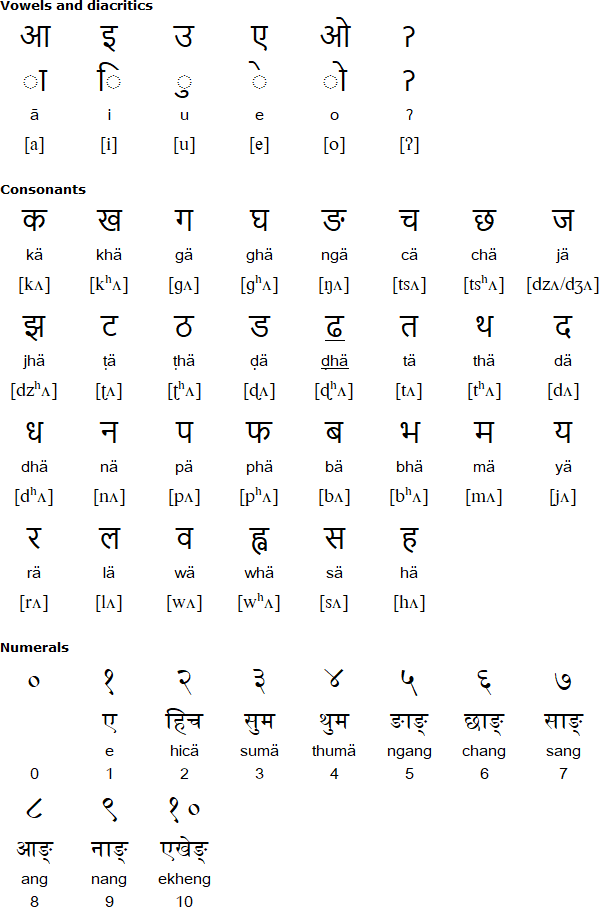Yakkha is a member of the Kiranti branch of the Sino-Tibetan language family. It is spoken mainly in eastern Nepal, and also in northern India, by about 21,900 people. In Nepal it is spoken by about 21,090 people in the Sankhuwasabha and Dhankuta districts of the Kosi zone. In India it is spoken by about 810 people in the north of Sikkim state and in Darjeeling district of West Bengal state.
Yakkha is also known as Dewansala, Jimi Bhasa, Yakha, Yakkha Ceya, Yakkhaba, Yakkhaba Cea, Yakkhaba Sala or Yakthomba. There are three dialects: Northern Yakkha, Southern Yakkha and Eastern Yakkha.
Yakkha is spoken mainly by adults, and to some extent by children and adolescents. It is taught in some schools, and used in literature. It is written with the Devanagari alphabet.

Download an alphabet chart for Yakkha (Excel)
घाक ओथोक चि चोननुङ नुङ तोक्लागा युक्थाम्बे वामानासोलोक निङवायोक नुङ इकले ङ्वाम्याहा। उङचि निङवा नुङ साघु तोक्साङन्दा यानेसाहा साहा ङवाम्याहा न्हाङ एको हेकोनाबे फुनुन्छागा बेभार चोक्माहा।
ɡʰak otʰokʌ tsi tsonʌnuŋʌ nuŋʌ toklaɡa juktʰambe wabanasolokʌ niŋʌwajokʌ nuŋʌ ikʌle ŋwamjaha. uŋʌtsi niŋʌwa nuŋʌ saɡʰu toksaŋʌnda janesaha saha ŋʌwamjaha nhaŋʌ eko hekonabe pʰununtsʰaɡa bebʰarʌ tsokmaha.
All human beings are born free and equal in dignity and rights. They are endowed with reason and conscience and should act towards one another in a spirit of brotherhood.
(Article 1 of the Universal Declaration of Human Rights)
Details provided by Biswajit Mandal (biswajitmandal[dot]bm90[at]gmail[dot]com)
Information about Yakkha
https://en.wikipedia.org/wiki/Yakkha_language
https://www.ethnologue.com/language/ybh
https://languageswithwilf.wordpress.com/2020/08/15/chapter-4-yakkha/
https://core.ac.uk/display/132161467
https://www.webonary.org/yakkha/?lang=en
Athpare, Bahing, Bantawa, Belhare, Chamling, Dhimal, Dumi, Khaling, Limbu, Sunwar, Toto, Wambule, Yakkha
Aka-Jeru, Angika, Athpare, Avestan, Awadhi, Bahing, Balti, Bantawa, Belhare, Bhili, Bhumij, Bilaspuri, Bodo, Bhojpuri, Braj, Car, Chamling, Chhantyal, Chhattisgarhi, Chambeali, Danwar, Dhatki, Dhimal, Dhundari, Digaro Mishmi, Dogri, Doteli, Gaddi, Garhwali, Gondi, Gurung, Halbi, Haryanvi, Hill Miri, Hindi, Ho, Jarawa, Jaunsari, Jirel, Jumli, Kagate, Kannauji, Kham, Kangri, Kashmiri, Khaling, Khandeshi, Kharia, Khortha, Korku, Konkani, Kullui, Kumaoni, Kurmali, Kurukh, Kusunda, Lambadi, Limbu, Lhomi, Lhowa, Magahi, Magar, Mahasu Pahari, Maithili, Maldivian, Malto, Mandeali, Marathi, Marwari, Mewari, Mundari, Nancowry. Newar, Nepali, Nimadi, Nishi, Onge, Pahari, Pali, Pangwali, Rajasthani, Rajbanshi, Rangpuri, Sadri, Sanskrit, Santali, Saraiki, Sirmauri, Sherpa, Shina, Sindhi, Sunwar, Sylheti, Tamang, Thakali, Thangmi, Wambule, Wancho, Yakkha, Yolmo
Page last modified: 09.06.24
[top]
You can support this site by Buying Me A Coffee, and if you like what you see on this page, you can use the buttons below to share it with people you know.

If you like this site and find it useful, you can support it by making a donation via PayPal or Patreon, or by contributing in other ways. Omniglot is how I make my living.
Note: all links on this site to Amazon.com, Amazon.co.uk
and Amazon.fr
are affiliate links. This means I earn a commission if you click on any of them and buy something. So by clicking on these links you can help to support this site.
[top]